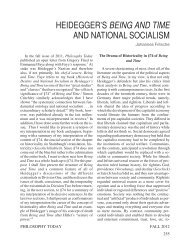Why Saying “I'm Sorry” Isn't Good Enough: The Ethics of Corporate ...
Why Saying “I'm Sorry” Isn't Good Enough: The Ethics of Corporate ...
Why Saying “I'm Sorry” Isn't Good Enough: The Ethics of Corporate ...
Create successful ePaper yourself
Turn your PDF publications into a flip-book with our unique Google optimized e-Paper software.
<strong>Ethics</strong> <strong>Corporate</strong> Apologies<br />
be predisposed let go <strong>of</strong> their fear and rage and to rebuild trust in and with the <strong>of</strong>fending<br />
firm.<br />
Unlike Austin (1962, 14-15), I would not require that the speaker intend to restore trust<br />
with his or her audience. <strong>The</strong> speaker’s actual intention is not something that can be<br />
easily determined by the audience who rarely has any personal knowledge whatsoever <strong>of</strong><br />
the apologizing CEO. xi However, apologizing executives must at least be seen and heard<br />
to be experiencing the correct, relevant emotions and commitments--e.g., some degree <strong>of</strong><br />
concern and a soberness <strong>of</strong> purpose. <strong>The</strong>se things manifest themselves physically in the<br />
face and bearing <strong>of</strong> the speaker, so the audience naturally wants to see the CEO<br />
apologizing in person. xii Merely sending an apologetic letter or text message will be less<br />
persuasive because these contexts are not sufficiently rich to restore trust. In those cases,<br />
stakeholders may be inclined to infer that a law or public relations firm has drafted the<br />
CEO’s comments and that the CEO and her firm are unwilling to face up directly to the<br />
stakeholders. That unwillingness may make an already angry or fearful audience more<br />
so.<br />
Element #7: Exhibiting Empathy<br />
Engendering trust with a view to remedying injuries and preventing future harm is easier<br />
when the audience perceives the apologizer as exhibiting empathy. (I say “perceived”<br />
because, again, we cannot know for sure what someone’s internal state or intentions<br />
are. xiii ) Rather than minimizing the damage their corporations have done, authentically<br />
apologizing CEOs demonstrate an awareness <strong>of</strong> the array <strong>of</strong> stakeholders whom they may<br />
have injured and <strong>of</strong> the painfulness and extent <strong>of</strong> the injuries attributed to actions <strong>of</strong> the<br />
32

















